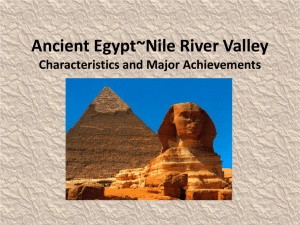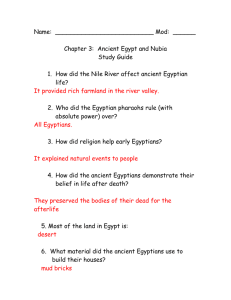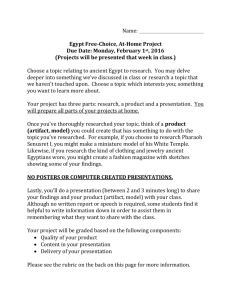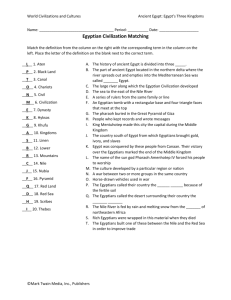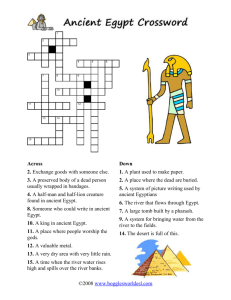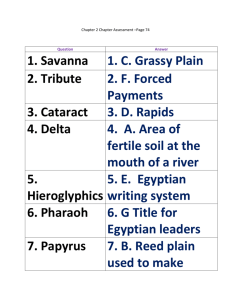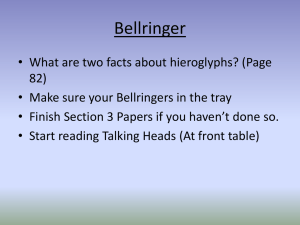Chapter 3 Test: Ancient Egypt
advertisement
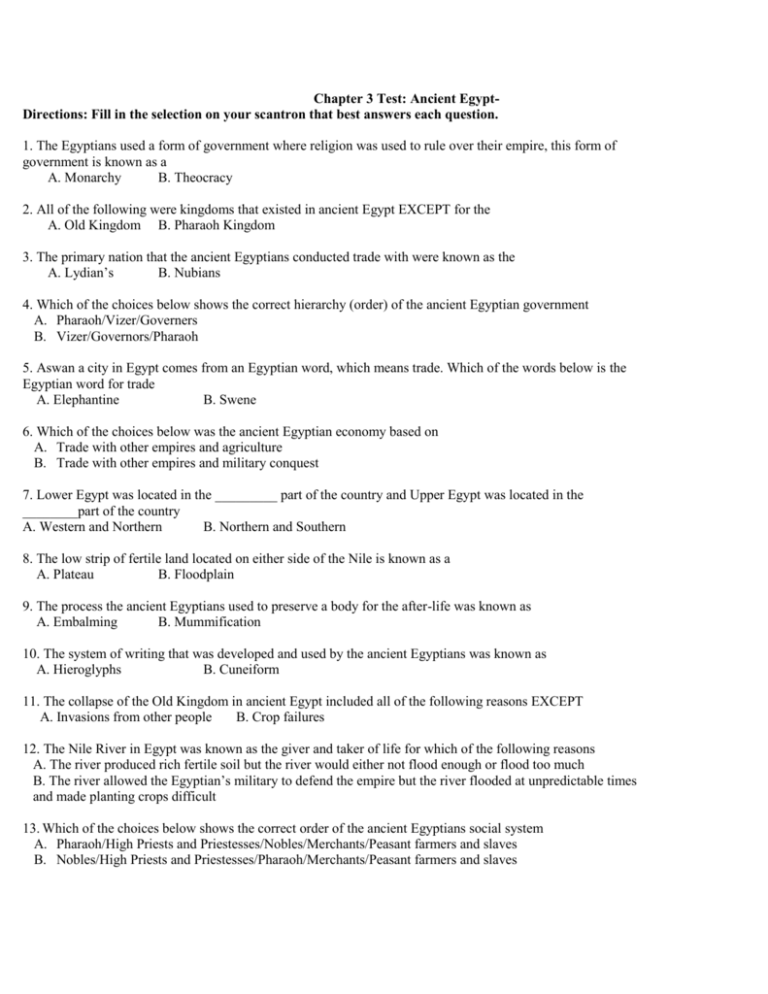
Chapter 3 Test: Ancient EgyptDirections: Fill in the selection on your scantron that best answers each question. 1. The Egyptians used a form of government where religion was used to rule over their empire, this form of government is known as a A. Monarchy B. Theocracy 2. All of the following were kingdoms that existed in ancient Egypt EXCEPT for the A. Old Kingdom B. Pharaoh Kingdom 3. The primary nation that the ancient Egyptians conducted trade with were known as the A. Lydian’s B. Nubians 4. Which of the choices below shows the correct hierarchy (order) of the ancient Egyptian government A. Pharaoh/Vizer/Governers B. Vizer/Governors/Pharaoh 5. Aswan a city in Egypt comes from an Egyptian word, which means trade. Which of the words below is the Egyptian word for trade A. Elephantine B. Swene 6. Which of the choices below was the ancient Egyptian economy based on A. Trade with other empires and agriculture B. Trade with other empires and military conquest 7. Lower Egypt was located in the _________ part of the country and Upper Egypt was located in the ________part of the country A. Western and Northern B. Northern and Southern 8. The low strip of fertile land located on either side of the Nile is known as a A. Plateau B. Floodplain 9. The process the ancient Egyptians used to preserve a body for the after-life was known as A. Embalming B. Mummification 10. The system of writing that was developed and used by the ancient Egyptians was known as A. Hieroglyphs B. Cuneiform 11. The collapse of the Old Kingdom in ancient Egypt included all of the following reasons EXCEPT A. Invasions from other people B. Crop failures 12. The Nile River in Egypt was known as the giver and taker of life for which of the following reasons A. The river produced rich fertile soil but the river would either not flood enough or flood too much B. The river allowed the Egyptian’s military to defend the empire but the river flooded at unpredictable times and made planting crops difficult 13. Which of the choices below shows the correct order of the ancient Egyptians social system A. Pharaoh/High Priests and Priestesses/Nobles/Merchants/Peasant farmers and slaves B. Nobles/High Priests and Priestesses/Pharaoh/Merchants/Peasant farmers and slaves 14. Women in ancient Egypt had all of the following rights EXCEPT for A. They could inherit land and handle business transactions B. Many became low ranking military leaders in the army 15. Ancient Egyptians were said to rely on which of the following to guide them through the after-life when they died A. They relied on the Pharaohs who died before them to guide them through the after-life B. They relied on the Book of the Dead to help guide them through the after-life 16. The pyramids of the ancient Egyptians were meant to show a Pharaoh’s _____________________ and _________________________ A. Military conquests and building achievements B. Authority and divine stature 17. Trade was important to the ancient Egyptians because they A. Lacked many natural resources B. Lacked the technology to develop things they needed 18. Legacies of the ancient Egyptians included all of the following EXCEPT A. Medicine B. Development of a banking system 19. The primary purpose for the pyramids in Egypt was A. To Serve as a tomb for the Pharaoh, his or her family, and the upper class B. To intimidate other empires by show off Egyptian technology 20. The solution the Egyptians came up with to solve some of the erratic flooding of the Nile was the use of A. Irrigation B. Damming the river 21. The Nile’s name originates from the Greek word Nelios, which means A. Taker of life B. River Valley 22. The two sources of the Nile River include the A. White Nile and the Blue Nile B. Little Nile and the White Nile 23. The reason for the ancient Egyptians burying the Pharaohs with their possessions was that A. The ancient Egyptians believed the Pharaohs remained God’s in the after-life B. They thought the Pharaohs used their possessions to pay their way into the after-life 24. The Nile was ancient Egypt’s greatest natural resource because it provided all of the following EXCEPT A. A barrier of protection from Egypt’s mortal enemy, Nubia B. Transportation for the Egyptian trade and military ships 25. Which one of the choices below were disadvantages to the Egyptian Theocracy A. Lack of individual identity and some people were forced to practice a religion they might not of believed in B. This form of government helped weaken the Egyptian military
